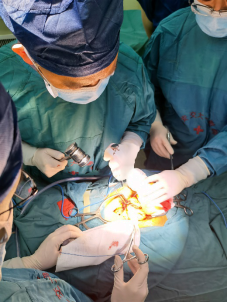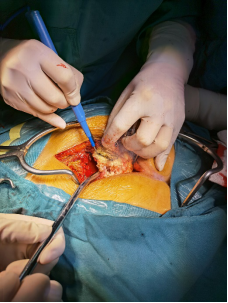Recently, multi-disciplinary team (MDT) of the First Affiliated Hospital of Xi 'an Jiaotong University (XJTU) successfully completed surgical resection of pelvic recurrence and metastasis from rectal cancer through the posterior sacral approach. Surgical resection of complicated pelvic metastasis from rectal cancer via the posterior sacral approach is a highly demanding procedure with high risk and multiple complications, which has been rarely reported at home and abroad.

Four months ago, the female patient, surnamed Wang, developed intermittent vaginal bleeding without evident origins, which were gradually worsened. She was diagnosed with recurrence of rectal cancer in several class A tertiary hospitals in Shaanxi province. The tumor invaded into the uterus, vagina and surrounding organs, and local physicians recommended palliative chemotherapy rather than surgical resection. However, the tumor was extremely insensitive to chemotherapy. She had received radiotherapy previously, which was terminated due to dose limit.
Her family relatives specifically sought Professor Chang Dongmin and Professor Zhu Kun from Department of Surgical Oncology of our hospital for professional assistance. Two professors carefully evaluated the patient's physical conditions and repeatedly analyzed her imaging data. Through the MDT collaboration group of Cancer Center, they held MDT discussions with Department of Obstetrics and Gynecology, Department of Orthopedics, Department of Urology, Department of Imaging, Department of Vascular Surgery, Department of Radiation Oncology, Department of Oncology and other departments to determine a preliminary treatment plan. Both the patient and her relatives decided to undergo surgery.
Imaging examination showed that the recurrent tumor was located in front of the pelvic sacrum, occupying almost the entire pelvic cavity, invading into uterus, vagina, sacrumand part of pelvic wall, possibly involving with bladder and surrounding internal iliac arteries and veins. Professor Chang Dongmin introduced that because the patient's tumor invaded into surrounding organs, transabdominal surgery might result in insufficient exposure of the tumor, failed to remove the tumor completely or control intraoperative bleeding and other disadvantages. Hence, surgical resection via the posterior sacral approach was recommended. However, it is extremely demanding to resect recurrent and metastatic tumors through the posterior sacral approach, and it is necessary to resect the sacrum and the invaded organs, such as uterus and vagina, through the posterior approach, which may not only cause massive intraoperative bleeding, but also increase surgical difficulty due to the special posture and approach. Besides, it is also likely to induce nerve injuries, such as defecation disorder and lower limb movement disorder, etc. Through MDT cooperation, a detailed surgical plan was determined.

After full preparation, double J tube was successfully indwelled, and the main blood supply vessels of the tumor were precisely embolized on the day before operation. On the day of operation, Professor Chang Dongmin, Professor Zhu Kun collaborated with Professor Li Qiling from Department of Obstetrics and Gynecology and Professor Han Xuezhe from Department of Orthopedics successfully performed "surgical resection of pelvic recurrence and metastasis from rectal cancer via the posterior sacral approach" according to the predetermined surgical plan. The surgery was successfully completed with slight bleeding. Postoperatively, the function of urination and defecation was not affected. After over 10-day postoperative recovery, the patient was discharged smoothly.
Surgical resection of complex tumor via the posterior sacral approach is a highly demanding and challenging procedure for surgeons, which requires intimate MDT collaboration. It is indeed a challenge to test the overall technical strength of both physicians and hospitals.